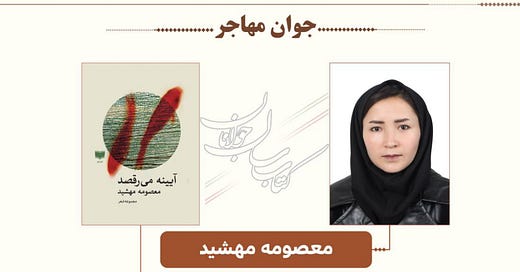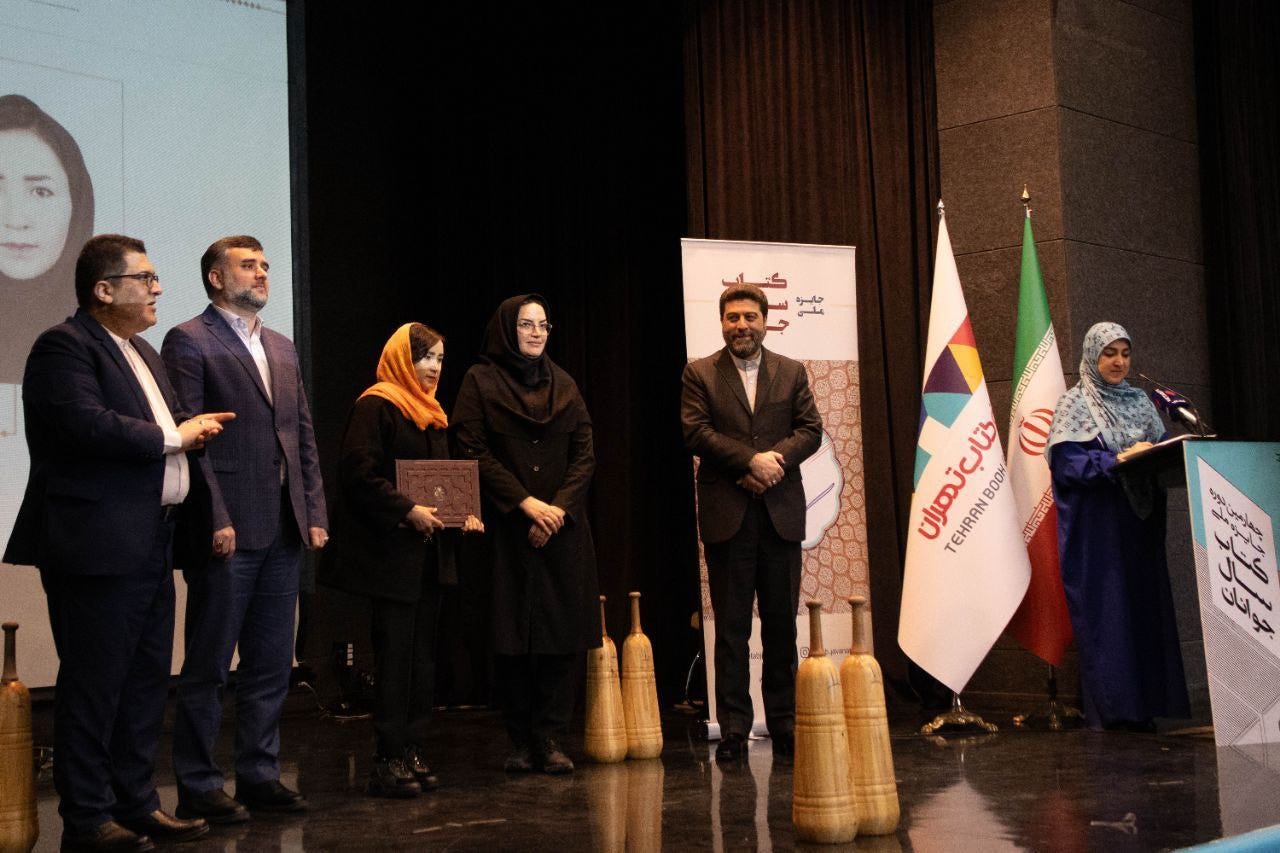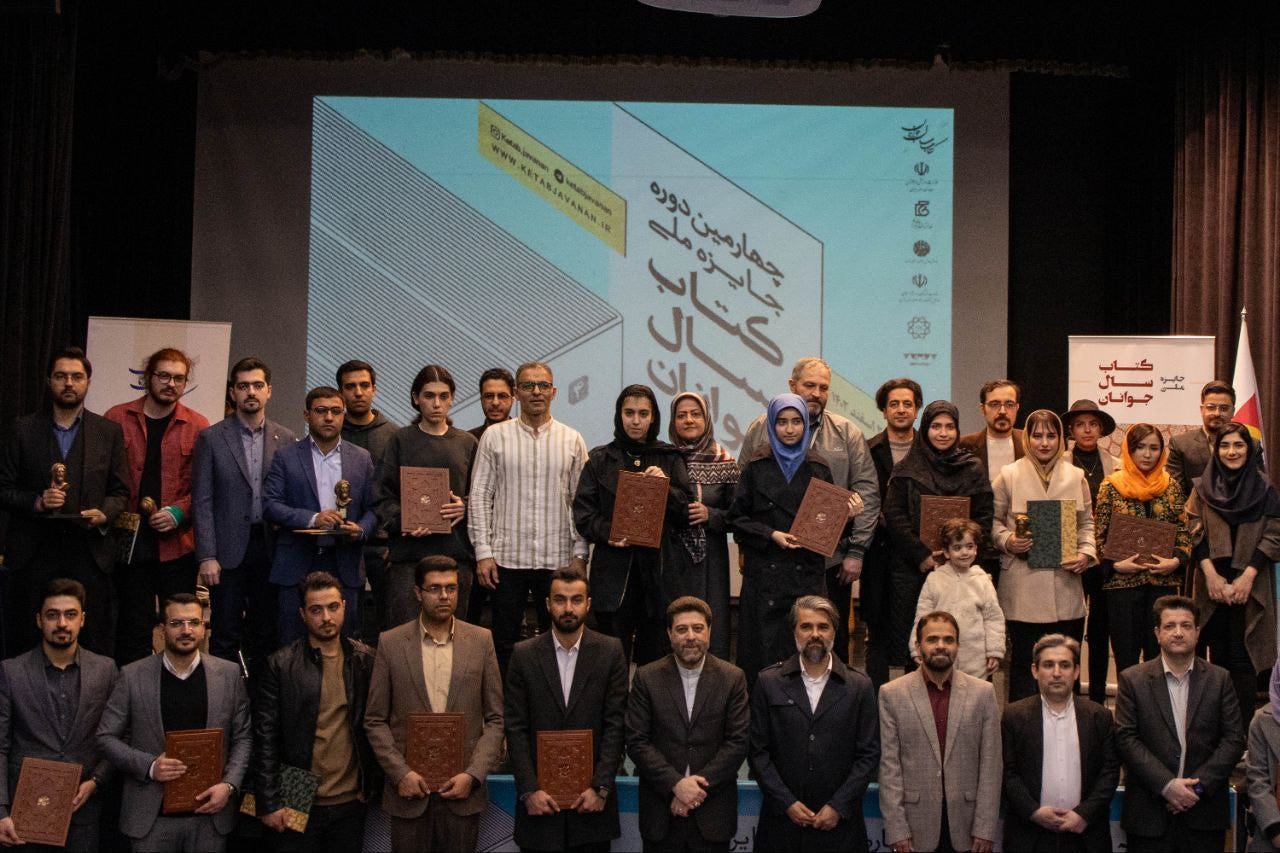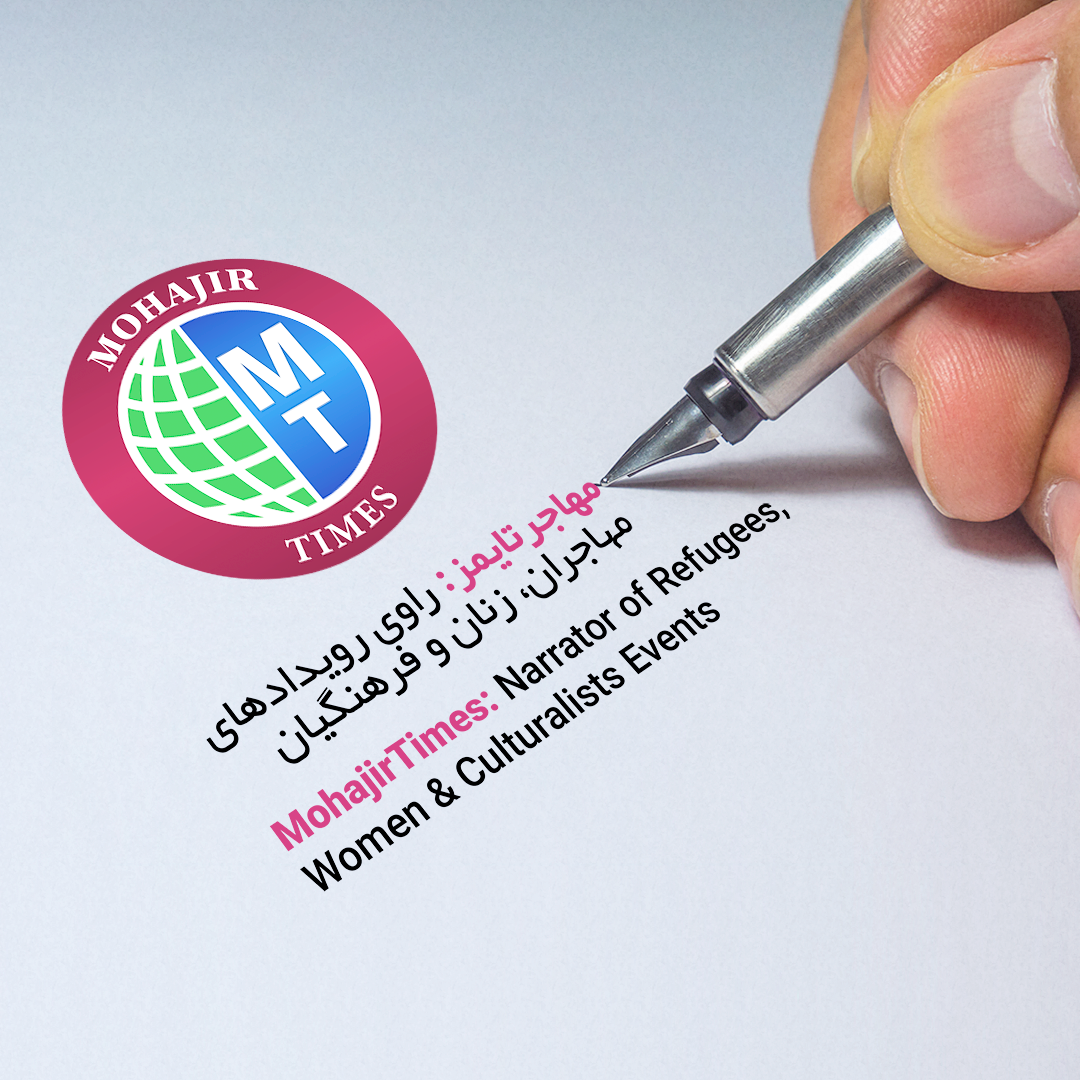The Mirror Dances—Is Narrator of the Pains and Joys, an Afghanistani Woman
Mohajir Times' interview with Masoumeh Mahshid, selected for the special section of the 4th Iranian Youth Book of the Year Award as an immigrant young
Interviewer: Asadullah Jafari “Pezhman”
At a time when fewer poets put different aspects and angles of social life as their poetic subjects, they mainly describe and define external observations in their verses. So, we went to the young immigrant poetess; each of her verses and poems describes the corners-angles within social and critical life norms in Afghanistan.
Masoumeh Mahshid is a poetess and young migrant born in 1998 in Ghazni Province, Afghanistan. She graduated with a bachelor's degree in computer science from Ghazni University and is currently a master's student in computer engineering at Yazd University. “The Mirror Dances” is the title of Masoumeh's first book of poetry, published in Tehran in 2023. In this interview, we went to Mahshid to get to know her better:
Mohajir Times: Thank you for giving us this opportunity to have this conversation; we have heard and know Mahshid only through the name of the book “Ayeneh Meraqsad” (The Mirror Dances). Now, we want the audience to know your lines and verses more. Firstly, we want you to introduce yourself to the audience and your poetry-loving fans.
Mahshid: Greetings! You are welcome. Thank you for providing the context for this conversation. I am Masoumeh Mahshid, born in 1998, a poetess. I write poetry occasionally and am currently a master's student. I was born in a rural village in one of the most remote villages of Ghazni province, in the Malistan District in the southeast of Afghanistan. Since the nineties, I have started writing poetry. I went to school at Makanak Girls' High School, Malistan District, Ghazni Province, and completed my Bachelor's degree in Computer Science in 2019 from Ghazni University. Now, I am a student at Yazd University's Master's Degree in Computer Engineering.
Mohajir Times: Now you are more visible by participating in a cultural event, and you have been chosen as an “Immigrant Young” from Afghanistan in the special section of the fourth period of the Iranian Youth Book of the Yearly Award, and its congratulations for you on this achievement. Thus, as a young immigrant and also from the women's community, what sense and message did your selection in the National Youth Book of the Yearly award have for you?
Mahshid: Thank you! I must remind that holding such cultural events and valuing the promotion of books, writing, and written culture in an age and time when everything has faded and summarized behind the pages of smartphones is a vast and promising task for all young people from all walks of life, cultures, languages, and different nationalities. During this period, I was also very happy and pleased that I was among the fourth National Youth Book of the Year Award winners as a young immigrant from the women and migrants community.
Mohajir Times: In what awards, events, and cultural festivals have you been chosen before?
Mahshid: Earlier in 2021, I won the second prize Statue of Peace in the “National Peace Poetry Festival” held between different provinces of Afghanistan in Kabul city.
Mohajir Times: Do you think writing poetry and saying-intone poetry is an acquired or inherent art?
Mahshid: In my opinion, in the beginning, no one is born a poet, painter, or artist, but every human being inherently has arts in her/him, the emergence and flourishing of which depends on the paths that people walk and the efforts that they make.
Mohajir Times: You won the National Youth Book of the Year Award for the book “The Mirror Dances,” a collection of your poems. Could you tell me about the details of this book, what the fields of the poems and verses of this work are, and who most of its audience is?
Mahshid: “The Mirror Dances” is a poetry collection whose content is mostly romantic and focused on social issues. However, from my own point of view, this work is a narrator of the pains, joys, and haves and have-nots of an Afghanistani woman's life from the heart of Afghanistan society. This collection includes 56 Ghazals, 5 Quatrains (Ode), and two Masnavis (Couplet-Poems), published in 103 pages in April 2023 by Amu Publishing House in Tehran.
Mohajir Times: So far, how many works have been published by you, and have these works only been in the field of poetry or other subjects?
Mahshid: In 2018, a poetry collection of Ghazna poets' Ghazals and couplets called "Crossing the Stone" was published by compiling of Hekmat Nazari, in which my Ghazals were also published in, and “The Mirror Dances” is my first poetry collection that It has been published in Iran this year.
Mohajir Times: When did your interest in poetry begin, and when did writing and saying poetry-intone become more critical and serious for you, and what was the motivation?
Mahshid: As I remember, I have loved poetry and poems since I knew my left and right hand. My first streaks of interest in poetry go back to my childhood. Although, in those days and times, in the environment where I grew up, there was no news of cultural and poetic books and programs, especially for children and teenagers. Nevertheless, since I can remember, every poem I read or heard from someone, I still would not miss it. I memorized it and or wrote notes in a notebook. I read it repeatedly and passionately until it was memorized in my mind.
However, since my older sister Kamela Kayhan entered the Farsi-Dari language and literature faculty at Ghazni University, she started writing poetry. Nevertheless, poetry reading and reading books opened up more in our house, and I also became interested in writing poetry. On the other hand, in the days when I was a bachelor's student at Ghazni University, the “Khayyam Literary House” in that city and its weekly meetings gave new enthusiasm to fans of poetry and writing. These few but great opportunities made me write poetry and become a poetess. After graduating from university, I thought I was more involved with poetry and literature. Maybe these are the shadows of poetry that have come to my feet over time.
Mohajir Times: In what formats and styles do you often write and say-intone poetry, what are the more themes and subjects of your poems?
Mahshid: As I mentioned before, most of my poems are in the form of Ghazal, Couplet, Quatrain, and Masnavis. Of course, I have not included my couplets in this collection, and I have decided to publish them in another collection in the following opportunities. The poems included in this collection have mostly romantic, social, and critical themes, which I wanted to write about and depict the dark atmosphere of the Taliban-dominated society from the perspective of a woman who is also one of the victims of such a society.
Mohajir Times: How did you choose the title of your poetry collection, “The Mirror Dances,” and what message does this title have for your subject and audience?
Mahshid: I have chosen “The Mirror Dances” title from one of the Ghazals of my inner book. The image and meaning of this title also refer to one of the scenes in Rahnaward Zaryab's novel called “Golnar and Mirror”:
“A flame seems to be spinning around itself
The mirror dances, but Golnar has fallen.”
In my point of view, this title is an example of courage and standing for women in our today's society. If they are in the midst of smoke, fire, and blood, they must fight for their rights. I have published this collection in a situation where the suffocation of the times in our society has left many people on their feet, and many pens that wrote about the pain and suffering of the people and society have stopped. I expect, apart from the verses in the book, this event alone will be a message of awakening, resistance, and standing for the youth, especially the girls of my country, Afghanistan.
Mohajir Times: As a young immigrant, what effects has immigration had on the status of your poetry?
Mahshid: Since I do not have much experience in the world of immigration and the time I spend in Iran is limited, or maybe because of the cultural affinity between the two countries, I still have not been able to free myself from the narrow atmosphere of the Taliban in my country, Afghanistan. Therefore, my poems have more of the color and smell of a woman living in Afghanistan than an immigrant in Iran.
Mohajir Times: What effect do poetry and literature have on the psyche of the world of displacement and migration and the situation of a young immigrant and migrants in general?
Mahshid: Although many people believe that literature and poetry do not actually cure pain and do not take the burden off the shoulders of humankind, in my opinion, poetry can heal the emotional, spiritual, and psychological wounds of humans. Migration literature, a new genre in narrative and fiction literature, has been expanded in the immigrant and refugee communities over the past few decades. At the same time, literature and poetry can be the language of displacements, sufferings, and migration from the bitter and sweet experiences of migrant people.
Mohajir Times: Which poets' works do you like and study the most, and also which poet's ideas have you been influenced by, and what is your opinion about Forugh Farrokhzad's poems?
Mahshid: Forugh Farrokhzad's poetic language is the language of a free and aware woman; it is enough that has been said about her: “Forugh Is the Super Poet of the Beyonds.” In the space of my poems, I favor Ghazal and Masnavis more than Sapid and Nimai's poetry (Blank Verse and Neo-Poetry). Therefore, among the classical and contemporary poems, most of the poems of contemporary poets such as Ibrahim Amini, Fazel Nazari, Kamela Kayhan, Hekmat Nazari, Mahtab Sahel, etc., whose poems I read at least every day in virtual space, and they are more attractive to me. Although I have not followed any particular school ideology of poetry and I have not followed anyone's style, I still have no doubt that the poems of today's poets have left an impact on my poetic style.
Mohajir Times: Thank you for your accompaniment-at the end, I would like you to read one of your poems from the content of the book “The Mirror Dances” for us and your audience:
Mahshid: Thank you for providing an opportunity to talk about poetry and immigration.
Always a razor in your hand and against me
My clothes and Chadar! What did it have to do with your religion?
Take, laugh, beat, oh! My step brother
How much is left until my last life?
How many kilos is God in your shop?
How much will I dance to your new instrument?
How long will I burn without your permission?
My hair is broken from your scrap faith
Although you requested from God, my torment
And forever closed my hand of choice
My heart is always hot and melting
By what right did you take my book, tell me?
Agreed, we are all infidels, and you are God's servant
Assuming you are the winner at the end of the line
We have become lambs, and wolves-You are the predatory wolf
We are always worthy of tears, and you are the ones who laugh
We are the same Tabasum, Farkhondeh and Shirin
We are sad twice, triple as much as our world
What does it matter which religion we are here
We do not see anything but death on the way
Although you cannot understand words and calculations
Always surah-e-Yassin, and you're a blockhead
How can I explain the pain to your faith?
Leave us alone, swear to your mother's grave!








خیلی عالی بود؛ به عنوان یک هموطن مایه ی افتخار ما .هستند